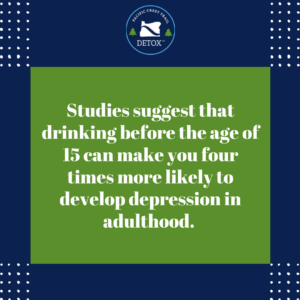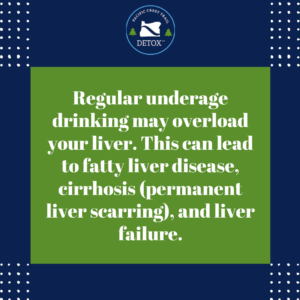Millions of young adults in the United States consume alcohol regularly. Whether it’s for occasional or recreational purposes, underage drinking poses health risks to you and your body. Alcohol use in teens may potentially lead to addiction, accidents, and even death.
Understanding the dangers of underage drinking can help you make informed choices and prevent all of this. If you’re ready to learn more, let’s dive in.
Immediate Health and Safety Risks
While drinking seems like harmless fun, underage drinking puts you at risk of several health and safety risks. Here are some of the most common consequences you should be aware of.
Physical Health
The effects of underage drinking are most prominent in your physical health. Below are the most common problems you may encounter:
- Disruption of brain development. When you drink alcohol, it disrupts your brain function and development. This can cause problems with memory, learning, and decision-making.
- Harm to vital organs. Underage drinking can also disrupt the development of your heart and liver. However, frequent exposure to alcohol can cause complications such as liver disease.
- Alcohol poisoning. Underage drinkers are more susceptible to alcohol poisoning. You may experience symptoms such as confusion, vomiting, and seizures.
Safety Concerns
While you may not realize it, alcohol consumption can put you at risk for more accident-related consequences. These are commonly due to how alcohol affects your regular brain function.
- Accidents and injuries. Drinking impairs your judgment and physical coordination. You may be prone to accidents while driving or walking under the influence of alcohol.
- Sexual assault and violence. Perpetrators tend to take advantage of those under the influence. Drinking also slows down your reaction time during dangerous situations.
Long-Term Health Impacts
Underage drinking may feel like a small act of rebellion and a taste of freedom; however, the long-term consequences you may face are far more concerning.
Mental Health
Your brain is a constantly developing organ. When this development is disrupted, you may be at risk for two potential dangers:
- Mental health disorders. Alcohol interferes with the regulation of your neurotransmitters. When this occurs, you may be at higher risk for depression and anxiety. Studies suggest that drinking before the age of 15 can make you four times more likely to develop depression in adulthood.
- Substance abuse. Early exposure to alcohol can make you more susceptible to alcohol dependence and addiction in adulthood.
Physical Health
Apart from mental health concerns, your physical health may also suffer.
- Damage to vital organs. Regular underage drinking may overload your liver. This can lead to fatty liver disease, cirrhosis (permanent liver scarring), and liver failure.
- Brain development. Early alcohol consumption is linked to memory and learning problems, and increased risk for dementia.
Academic and Social Consequences
Underage drinking has consequences beyond your physical and mental well-being and can ripple further to aspects you may not realize.
As a teen, the effects of underage drinking may be more prominent on your academic success and relationships.
- Academic performance. Alcohol disrupts your memory, focus, and decision-making. You may have difficulty concentrating in class, doing homework, and taking exams.
- Social relationships. Underage drinking can make your parents and loved ones concerned and frustrated about your safety, eventually leading to tension.
Potential Legal Issues And Future Complications
Despite your young age, you are still subject to legal constraints that can affect your future.
- Legal issues. Getting caught with underage drinking can result in fines, community service, and license suspension. In severe cases, it may also lead to criminal charges.
- Future opportunities. A criminal record due to underage drinking can make it difficult for you to get accepted into university, secure loans, and land a job.
Factors Contributing to Underage Drinking
As a young adult, you may feel as if you’re constantly being criminalized or misunderstood for your drinking habits. While it’s crucial to know the consequences, you must also understand the factors that cause you to drink in the first place.
Peer Pressure
The common denominator in vices among young adults is peer pressure. As a teenager, it’s normal to crave social connection and acceptance. When drinking is a norm in your social circles, you may feel pressured to join in to avoid being left out.
Media And Advertising
Exposure to alcohol does not only occur with people you are physically around; the commodity of alcohol on television can also influence your habits.
Movies, music videos, and advertisements portray that bars are where happiness, freedom, and healing are found. However, this is often unrealistic and only makes underage drinking more attractive to teens.
Family And Environment
As a developing being, your environment largely influences your habits. This includes the people you spend time with and the locations you frequent.
- Parental influence. If your family is openly dysfunctional, you may turn to drinking as a coping mechanism. Excessive drinking at home also makes you more accustomed to the activity.
- Accessibility. Readily available alcohol at home, unsupervised drinks at parties, and poor age restrictions in stores can make you more likely to engage in drinking.
In Conclusion
Underage drinking carries risks to your immediate health, long-term well-being, and even your future. You may be at risk for liver disease, poor academic performance, and even legal trouble.
However, being a young adult also means you have all the time in the world to refrain from making these consequences worse. By understanding the risks and factors contributing to underage drinking, you can make informed choices that ensure your safety, health, and overall well-being. Remember, there are ways to enjoy your youth without endangering your future.
If you’re looking to learn more about these alternative activities or alcohol detox in Oregon, contact us at Pacific Crest Trail Detox for more information!




